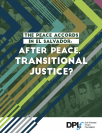Thirty years ago, a new era began in El Salvador. On January 16, 1992, the government signed a peace agreement with left-wing guerrillas ending the 12-year-long civil war, during which at least 75,000 people perished. The Peace Accords, their implementation and limitations, and the transitional process that followed, which included a truth commission that laid bare the atrocities committed during the internal conflict, can provide valuable lessons for peace processes following conflict. To this day, the Peace Accords, and what they represent, remain a source of contention in El Salvador, and the anniversary of their signing highlights the political polarization that still surrounds the conflict and post-conflict processes.
On the 30th anniversary of the signing of Peace Accords in El Salvador, and as we reflect on their impact and shortcomings, we ask the following questions: can we define the measures included in the Accords as transitional justice? How should we characterize the nature of challenges related to the internal conflict of that past that are (re)emerging in the current political climate? What lessons can be learned from El Salvador’s experience that are relevant for other transitional societies? This document, The Peace Accords in El Salvador: After peace, transitional justice? addresses these questions and provides a succinct overview of the post-conflict challenges and opportunities for the advancement of the right to truth, justice, and memory in El Salvador.
Read the report here.






